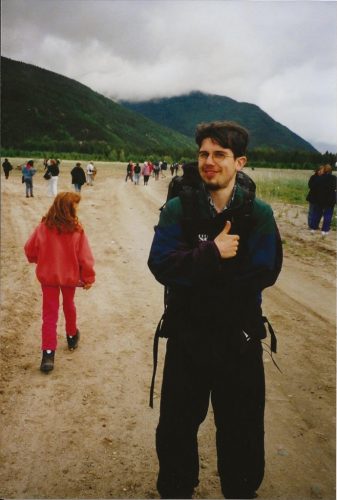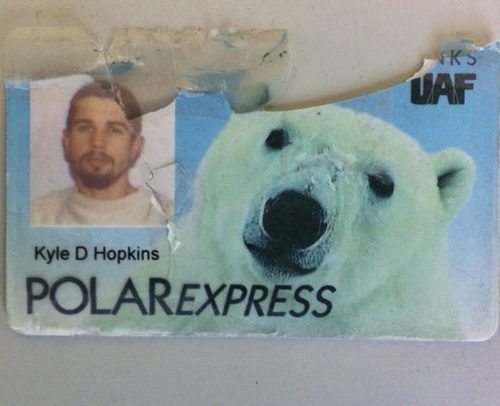Pulitzer winner Kyle Hopkins discovered his passion at UAF
March 2, 2021

During his senior year of high school, Kyle Hopkins ’00 struggled with grown-up problems. After his father was diagnosed with Hodgkin’s disease, his mother traveled to Seattle with him for treatment. This left Hopkins alone in Skagway.
He excelled academically, though, earning scholarships to the University of Alaska Fairbanks, where some of his friends were already enrolled. While he knew it made sense to attend UAF instead of a more expensive out-of-state school, he struggled with choosing a major.
Initially, he was intrigued by the sciences. After asking himself what he would do if he could spend his days in any way he wanted, Hopkins realized his true passion was reading.
That’s when an advisor suggested the publishing field, leading to a recommendation to take journalism classes. After he joined that program, he met Sherry Simpson ’86, ’95. Simpson, who died in October 2020, showed him what a career in journalism could be like, he said.
“I adored her,” Hopkins said. “She was like my hero, my favorite person. She wrote really beautifully about Alaska. She had a really nice way of describing the Alaskan experience, but she had also been a work-a-day, meat-and-potatoes, daily newspaper reporter.”
Other professors challenged him in different ways, often with a confrontational kind of toughness that he liked.
“What really struck me was that I really liked the people who are reporters,” he said. “There's something about this breed of people that I really like being around.”

Turns out, Hopkins liked being in the newsroom, too. He found his internships exciting and didn't look back. Now, he’s built a vocation from his passion.
Hopkins worked at the Fairbanks Daily News-Miner and a few out-of-state newspapers. The Anchorage Daily News eventually hired him, though it took some time.
“I've always wanted to work there,” he said. “But they just wouldn't hire me. I just could barely get an interview, upon graduation. So I worked for the Anchorage Press for a year. And I just kept asking for a job and eventually got hired by the Anchorage Daily News.”
Hopkins’ interests evolved, moving from dog races and feature stories to projects that dealt with issues of justice.
“Now it’s about trying to put a spotlight on things that feel wrong, just trying to write about things that matter and say, ‘Look, this process is broken. It doesn't have to be broken and here's why,’” he said.
Laureli Ivanoff ’16, former KNOM news director and an Alaska Dispatch News rural columnist, worked alongside Hopkins.
“As he has continued to reveal more about the important issues we face, my respect has grown to sincere and deep appreciation,” she said. “He sheds much-needed light on uncomfortable and disturbing truths with sensitivity and cultural awareness.”
Even with his success as a reporter, Hopkins faced many challenges. He thought seriously about quitting after the Anchorage Daily News was purchased by the online news organization Alaska Dispatch. As a husband and father dealing with a newspaper facing bankruptcy, he found himself at a crossroads.
“It's a hard industry to be in and have any sense of stability,” Hopkins said. “I felt a little irresponsible for not doing something more stable. I was ready to step away, but I had all these stories I felt like I should have told and so I gave myself one more swing.”
Hopkins realized he wanted to work on more long-term projects. He teamed up with ProPublica, an independent, nonprofit newsroom that produces investigative journalism, for a project called “Lawless: Sexual Violence in Alaska.”
But that’s not how the piece started out. His first pitch was for a story about the scarcity of housing off the road system.
“Around that time there was some really horrific sexual assault cases,” he said. “I noticed there was this watershed moment when people were interested in talking about this problem in a way that they hadn't before. It just felt like the timing was right.”
ProPublica agreed to make that the focus of the project. It grew into a collaboration that won the 2020 Pulitzer Prize for public service.
“I didn’t intend for the first story to get a lot of attention, but it had millions of readers because it was on Apple News,” Hopkins said. “There was no intention for this series to be about the lack of law enforcement. I just felt like it was context that we needed to establish before we talked about other issues. And that led to the disaster declaration.”
In June 2019, U.S. Attorney General William P. Barr declared a public safety emergency in rural Alaska and announced more than $10 million in federal funding to support law enforcement in Alaska Native villages.
Though the project was initially slated to take one year, that led to a second. Now Hopkins is participating in the third year of the partnership.
“I could spend the next 20 years writing their stories,” he said. “Lives are at stake, and there's obviously been an injustice.”
As Hopkins got deeper into the content, he also questioned whether he was the best person to tell these stories.
“I'm a white male living in Anchorage,” he said. “I wondered if it was better to wait for someone else. There's probably a better person to tell these stories. I had a lot of concerns about that.”
Ivanoff, an Indigenous woman from rural Alaska, understands the importance of the media’s role in accurately reflecting the strengths and challenges facing Alaska communities. She credited Hopkins with taking this responsibility seriously.
“Any journalist can tell what is happening,” she said. “A good journalist is one who makes a difference and goes deeper into the story, sharing experiences with accuracy, tenacity and respect.”
Hopkins also saw the toll reporting on these difficult topics took on his own emotional state. He started going to counseling for depression. That and his personal history gave him compassion for the victims he interviewed.
“I did a lot of crime reporting before this project, so I was used to writing about unpleasant things and talking to crime victims. The thing that was upsetting about this was the volume,” he said. “When you talk to someone who experienced sexual violence from childhood throughout adulthood, there's a bit of a hopelessness. And there just were so many examples. That was overwhelming.”

Hopkins received the UAF Alumni Association's 2021 Distinguished Alumnus Award. Charles Mason, UAF Communication and Journalism Department chair, nominated him for the honor.
“All of us who knew or taught Kyle journalism at UAF could not be prouder of his Pulitzer Prize or happier for Kyle on his amazing success,” Mason said.
Hopkins said he is delighted that his alma mater is recognizing the work he has accomplished.
“I think back to when I was in high school, and I was so excited to get the letter of acceptance to UAF,” he said. “I was really proud to be on the cross-country team and loved wearing my UAF uniform. It feels good, all these years later, to get this pat on the back.”
He encourages UAF students to follow their passion, even when faced with a changing and uncertain future, as in the field of journalism.
“It can be a scary thing to walk into when you're starting your career,” Hopkins said. “But I also think the tools that we have now and the ability that we have to connect with the audience are unreal. It's such an exciting time to be doing this work.”


